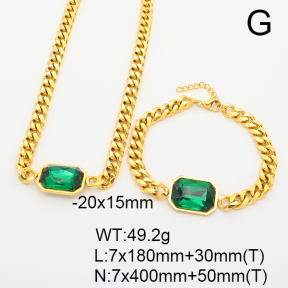Jewelry stainless steel vs titanium jewelry, what is the difference?
.jpg?x-oss-process=style/size_100_100)
When it comes to choosing jewelry, the material you select plays a crucial role in determining not only the appearance but also the durability and longevity of your accessories. Two popular choices for contemporary jewelry are stainless steel and titanium. In this comprehensive guide, we will explore the differences between stainless steel and titanium jewelry, helping you make an informed decision when selecting your next piece.
Stainless Steel Jewelry:
Composition:
Stainless steel is an alloy composed primarily of iron, along with chromium, and sometimes nickel and molybdenum. The specific grade of stainless steel used in jewelry is typically 304 or 316 stainless steel. These alloys are known for their corrosion resistance and durability.
Appearance:
Stainless steel jewelry often boasts a bright, shiny finish that resembles polished silver. It can be used to create a wide range of jewelry styles, from classic to modern.
Durability:
Stainless steel is highly durable and resistant to tarnish, corrosion, and rust. It can withstand daily wear and exposure to moisture without losing its luster. This durability makes it an excellent choice for everyday jewelry.
Hypoallergenic:
Stainless steel is generally hypoallergenic, making it suitable for individuals with sensitive skin. However, some people with nickel allergies may need to be cautious, as some types of stainless steel contain trace amounts of nickel.
Versatility:
Stainless steel is versatile and can be used to create a variety of jewelry pieces, including rings, necklaces, bracelets, and earrings. It is often used as an affordable alternative to precious metals like gold or platinum.
Titanium Jewelry:
Composition:
Titanium is a chemical element known for its strength and lightness. In jewelry, pure titanium is often used, but titanium alloys are also common. Titanium Grade 2 and Titanium Grade 5 are popular choices for jewelry due to their biocompatibility and corrosion resistance.
Appearance:
Titanium jewelry typically has a sleek, modern appearance. It can be finished with a matte or brushed texture, or it can be polished to a shiny finish. Titanium's natural color is silver-gray, but it can also be anodized to produce a variety of vibrant colors.
Durability:
Titanium is exceptionally durable and lightweight. It is highly resistant to scratches, corrosion, and tarnish. This durability makes it an excellent choice for jewelry that needs to withstand daily wear and tear.
Hypoallergenic:
Titanium is known for being hypoallergenic, making it an ideal choice for those with sensitive skin or metal allergies. It does not contain common allergens like nickel or cobalt.
Versatility:
Titanium is a versatile material that can be used to create a wide range of jewelry styles, from simple and minimalist designs to more intricate and elaborate pieces. It is particularly popular for wedding bands and men's jewelry due to its strength and durability.
Key Differences Between stainless steel vs titanium jewelry:
Composition: Stainless steel is primarily composed of iron and chromium, while titanium is a chemical element known for its strength.
Appearance: Stainless steel has a bright, shiny finish resembling polished silver, whereas titanium jewelry often has a sleek, modern appearance and can come in various colors.
Durability: Both stainless steel and titanium are highly durable, but titanium is exceptionally lightweight and resistant to scratches.
Hypoallergenic: Both materials are generally hypoallergenic, but stainless steel may contain trace amounts of nickel, which can be an allergen for some individuals.
Versatility: Both stainless steel and titanium are versatile materials used to create various jewelry styles, but titanium is often preferred for its lightweight and contemporary aesthetic.
Choosing Between stainless steel vs titanium jewelry:
The choice between stainless steel and titanium jewelry ultimately depends on your personal preferences and needs. Here are some factors to consider when making your decision:
Style: Stainless steel vs titanium jewelry,Consider the style and aesthetic you prefer. Stainless steel offers a classic, shiny appearance, while titanium provides a sleek, modern look.
Durability: Stainless steel vs titanium jewelry,Both materials are highly durable, but titanium is exceptionally lightweight and scratch-resistant, making it an excellent choice for those who want robust jewelry.
Hypoallergenic Properties:Stainless steel vs titanium jewelry, If you have sensitive skin or metal allergies, both stainless steel and titanium are generally safe choices. However, you may want to choose titanium if you have a severe nickel allergy.
Budget: Stainless steel vs titanium jewelry,Both stainless steel and titanium jewelry tend to be more affordable than precious metals like gold or platinum, but prices may vary based on the specific design and quality.
Occasion: Stainless steel vs titanium jewelry,Consider the occasion for which you intend to wear the jewelry. Stainless steel is versatile and suitable for everyday wear, while titanium's modern aesthetic makes it popular for contemporary and special occasion jewelry.
In conclusion, stainless steel vs titanium jewelry,offering distinct characteristics and aesthetics. Your choice between the two will depend on your personal style, preferences, and the specific qualities you value in your jewelry. Regardless of your choice, both materials provide durable and stylish options for a wide range of jewelry designs.





